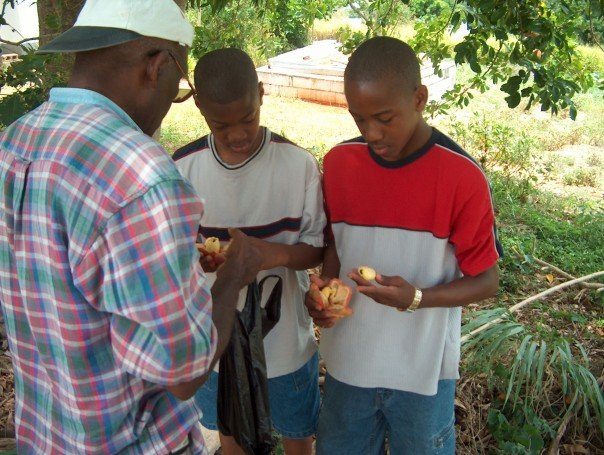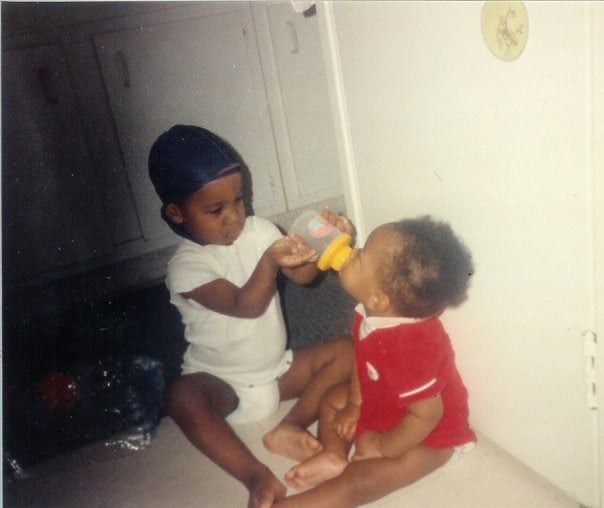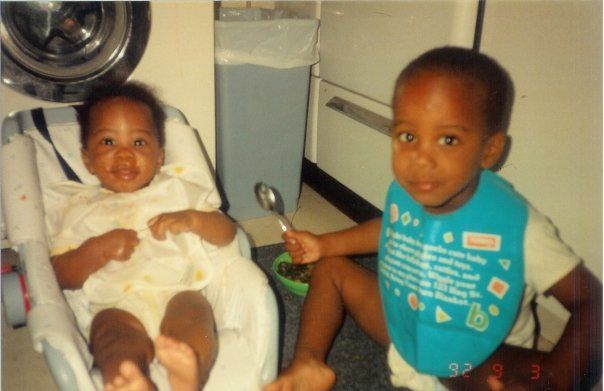I am both the oldest sibling and the oldest of 15+ cousins on my father’s side of the family. As a younger child, I felt being the oldest carried a special burden that I did not particularly enjoy, but as I have grown older and taken a retrospective look at my childhood, I realize that there are so many lessons that I learned (and continue to learn) as an elder sibling. These lessons can definitely be learned other ways in life, but the experience is a special and unique one when these lessons are viewed through the eyes of an elder sibling.
1. You learn how to share (although perhaps not willingly).
As an elder sibling or oldest child, at the beginning of your life, you enjoy all of the privileges and benefits of having everything to yourself! But somewhere along the line that all changes. All of the things you called “yours” now belong to you and another tiny little human. The same number of Christmas presents sit under the tree, but now only half of them belong to you. It is among the more difficult lessons to learn as a young child, and most times it is a lesson learned under duress, but in the end, you learn how to accept sharing with someone else.
2. You learn that life is not always fair.
Soon after learning how (or being forced to) share, there is usually an exclamation of “Life’s not fair!!” My parents quickly realized that particular battle was a losing one, especially as I accumulated a great amount of evidence to prove my point. So they quickly changed their tune, and began to teach me that fair is not always equal, and that my younger brother shared the same bedtime simply because it was easier to manage.
3. You learn the importance of setting an example.
As the elder sibling, you are an example.
Your younger sibling will copy everything you do, even on a subconscious level. From the way they speak, to the books they read, to even the way they write the letter “t”—all of can be traced back to you. This is very important as it means that, for better or for worse, you have and will continue to have a tremendous impact on them.
My brother and I picking and inspecting ackee in Jamaica.
4. You learn how to share blame (correctly).
I can distinctly remember being being grounded many times as a child for my mischievous plots. And though I didn’t enjoy the fruits of my labor, I understood why I was being punished. The worst punishments, however, were the ones that came as a result of my younger brother doing something wrong, followed by my parents saying, “You should have been there,” or “You should look out for your brother,” or any similar sayings.
I quickly learned to give credit when things went right, and that I should be the first to step forward when things went wrong. This doesn’t mean my brother and I never played the blame game though.
5. You learn to make friends and be inclusive.
I have a cousin who is three months younger than me. For the first four or five years of our lives, we were the best of friends, just the two of us. Somewhere in the middle of that time period, my younger brother was born, and I figured my parents would keep him company, because I didn’t have time, and I already had a friend. Sad, but true.
But one day, my mother pulled me aside (probably literally, I can’t remember) and gave me a wise and simple admonition.
That is your brother. He is your best friend, and will be there always, after we’re gone, before you get married, and before your other friends. Include him, because he will be there forever.
And somehow it clicked! I learned how to include him in everything I did, and that skill transferred over to my interactions with others. As an elder sibling, you learn how to include your other siblings in your life (to a degree), and doing so with people outside of your family helps you make friends.
6. You learn how to be a leader.
You are the first one into the dark, the one who the other siblings expect to come up with the plan, with the activities for the night. Eventually, you figure out that, as a leader, things do not always go according to plan, and you learn how to figure things out on the fly. You learn to delegate. You begin to practice the essential skills that any good leader must have.
7. You practice teaching skills and ideas to someone else.
As an elder sibling, you are an educational television show that your younger sibling watches from dawn till dusk. They learn how to tie their shoes, how to talk, how to write, and how to act, all in part by watching how you do these things. My parents, for example, took full advantage of teaching things once, and then I assisted in passing those lessons on to my brother. From how to do laundry, to folding clothes, to help with homework (that I had completed myself three years prior), and how to tie a tie. You also get the added bonus of getting better as you practice these things while teaching them!
8. You learn how to cooperate and work as a team.
This is one of the best parts of having a sibling. Once I got over including my brother in the things I did, I realized that he was the best teammate that I could have ever asked for. Our dynamic duo has caused more trouble than my mom initially planned for when she gave me the advice to make him my best friend, but it has also taught me the invaluable lesson of cooperation and teamwork. From missions to play video games in the middle of the night to networking and our chemistry and communication on the basketball court, I have learned so many lessons on what it takes to make a great teammate from my experience with my younger brother.
9. You learn how to give advice and the power of influence (both good AND bad).
Younger siblings are an open invitation, a scientific study in the area of influence. My influence played a part in sneaking out of the house, in “borrowing” the car, in several reckless golf cart races, and many other escapades.
You also learn to listen and give advice. My brother can TALK. We would spend days apart at school and our nights would conclude with his dissertation of the day’s events. Usually I fell asleep before these filibusters ended, and he would end up talking us both to sleep. But before falling asleep, I would give him advice on how to handle situations he was facing. I learned how to give advice he would accept, and I learned how to deal with him not taking my advice.
10. You learn how to take care of yourself (and others).
For years, my mother was the resident nurse and chef. As soon as I was old enough, my mother tasked me with helping her in the kitchen. This advanced to preparing dinner for my brother and I, making salad, making breakfast, etc. And with that, her job was complete. She no longer had to make pancakes or wrap sprained ankles, unless she was feeling nostalgic. I could now take care of myself (enough to stay alive), and my brother came to me for assistance or sustenance, until he figured those things out for himself.
Feeding my brother. It started early!
11. You learn how to manage frustration.
Your younger sibling can at first seem like a horrible beta test, the iOS 3 to your iOS 6. I can remember being frustrated many times, because I was forced to include my brother in activities where I knew I would be frustrated with him. Given the task of raking leaves at Grandma’s house? I KNEW it would take longer and add more frustration when he would “get tired” and stop working.
But in those moments, I learned how to manage my frustration, control my expectations, adjust my plan, and keep the big picture in mind. You continually learn that every frustration is not permanent, and some are not even worth the stress.
That’s not only food on my face. That’s frustration.
12. You learn how to be a silver-tongued politician.
There were countless times when I was chosen (by my younger brother) to be the voice of reason that explained a situation to our parents, the lawyer to plead whatever our current case was, or the con man to get our parents to agree to something they had previously negated. This is important because it taught me the different ways to speak to people, and the results those different ways produced.
13. You develop a good work ethic.
Adults realize how much an older child can assist in the raising of a younger child. So, as a part of setting an example, the work ethic of an elder sibling is rarely allowed to slack. I was constantly told, “If you work hard, the others will follow.” And at first, I worked hard because I was told, or to set that good example, until it became a part of who I was.
After a while, I would work hard at a task until it was completed, not because anyone was watching, but because it had become practice. I don’t doubt this would have happened had I been an only child, but it helped having to set an example of a good work ethic.
14. You learn the importance of letting someone learn from their mistakes.
My brother and I did almost everything together until I got to high school. We were one person, named CJandCharis. Wherever I went, he went. I went away for my sophomore year, and when I came home, I realized that although we were similar, he was not just a younger version of myself. We were similar, yes, but he was developing into his own personality and making his own choices.
So I had to learn, as I’m sure all elder siblings have, to give him space to grow. I could listen and give advice, but he had to live his life, successes and failures. Sometimes, that involved stepping back and allowing him to trip and fall (metaphorically and physically), so that he would have his own experiences and mistakes as evidence to learn from.
15. You learn how to encourage someone else.
If there were an “Elder Sibling Handbook,” one of the early chapters would be devoted to how to perfect the words “You can do it!” and other encouraging phrases are. You encourage your younger siblings as they take their first steps, as they learn their first words, when they struggle in school, as they practice for their role in the play, while you teach them how to play basketball, and in countless other areas. You can quickly become your sibling’s biggest supporter, even when they are not around.
This list is long! But there are so may more things that you out there have learned in your own experience as an elder sibling, or perhaps from your elder sibling. Share those lessons and funny stories below!















































